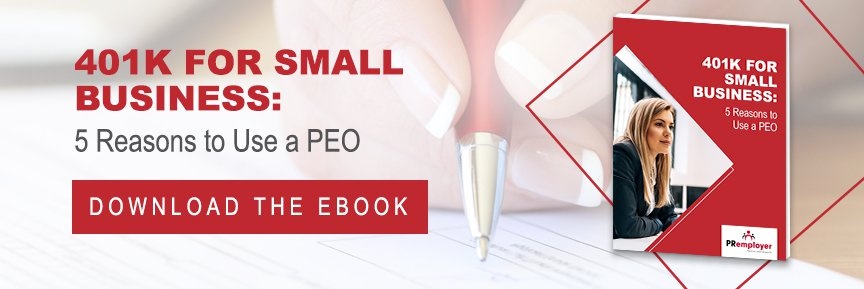.jpg?width=700&name=shutterstock_316859591%20(1).jpg)
With the right 401(k) plan in place, you can provide the proper level of support to your employees and promote the success of your company. However, the plan must suit the needs of your business and employees to have a positive impact. To ensure you select the right one, you must thoroughly research the available options and weigh all the most important considerations. You can get started by better understanding the top five things you must research and consider when exploring a new 401(k) for your business.
1. Fees
As you aim to balance value with affordability in choosing a 401(k) plan, it is important to understand all the potential fees. Many companies pay $85,000 to $2510,000 for someone to administer their plan, with additional fees per employee. In addition, your employees are also responsible for certain fees to cover their side of the management expenses.
The fees vary based on your plan and can apply at different times. To cover the annual upkeep of the plan, you may pay asset-based fees, for example, which typically equal up 2% to 3% of the total assets held but can go up to 4%. Alternatively, the provider may apply a flat rate or per-person fees on an annual basis. Fees for transactions, investment advice, and other direct services often apply as well.
2. Liability
When you choose to sponsor a 401(k) plan for your employees, you are held to a high level of responsibility for the plan, or fiduciary liability. You are expected to meet the responsibilities outlined by the Employee Retirement Income Security Act (ERISA). Otherwise, you can be personally liable for any errors or discrepancies and you could face lawsuits and other serious repercussions with each liability claim.
The responsibilities assigned to fiduciaries include depositing employee contributions in a timely manner and using plan assets to cover reasonable expenses. You may also be tasked with finding skilled monitoring companies and establishing the right protections for the held assets. If you cannot tend to these areas as required by law, then it may be beneficial to partner with a professional employer organization, or PEO, who can.
3. Auditing Requirements
As you search for the best 401(k) plan, take a close look at auditing requirements and see if, and how, they might affect your company. If you have more than 100 employees who are eligible to participate in the plan, then you will need to have an external audit performed on an annual basis. You will also need to hire an outside accounting firm to perform and submit the audit.
Your selected accounting firm will likely take up to six weeks to complete a full audit of your 401(k). Beyond taking up a lot of time, these audits can also come with hefty expenses based on your company size and location. You must complete them - and on time - or your company could face harsh penalties. Filing late can result in charges of $25 150 per day, as of January 1, 2020, with fines not to exceed up to $$150,000 in total, from the Internal Revenue Service (IRS). On top of that, the Department of Labor can also assign fines of up to $1,100late penalty filing can run up to $2,529 a day with no maximum.
4. Customization
Cookie-cutter 401(k) plans may not adequately support the needs of your employees and the company as a whole. Instead, you need providers who make it their mission to provide plans that are personalized to each client. They should allow you to customize many of the terms to suit your company, such as:
- Eligibility schedule
- Investments
- Profit-sharing
- Enrollment mechanism
- Opt-out options
Customizing all these variables, and more helps to better align the terms of the plan with your employees’ needs. This motivates them to stick around and continue promoting the success of your company.
5. Compliance
As a 401(k) plan sponsor, you must ensure that every facet of your plan aligns with state and federal laws. The Internal Revenue Code, in particular, details all the requirements the plan must abide by to remain in compliance. Beyond ensuring your plan meets the requirements from the start, you must also perform yearly reviews to verify it continues to operate within the law. Otherwise, you could face huge fines and even run the risk of losing your plan’s tax-exempt status.
Choosing the Best 401(k) Option for Your Company
When you choose the best 401(k) option for your company, you can trust that it will contribute to the continued growth and success of your business. You can go one step further in ensuring your business success by having a PEO like PRemployer handle every phase of this important process.
They can oversee the customization, management, and audit needs of your plan, and ensure it remains in compliance at all times. They assume fiduciary liability for you, protecting you from those repercussions while keeping fees at 1% for all their clients. Learn how the qualified professionals at PRemployer can make it easy for you to offer the right 401(k) to your employees.

